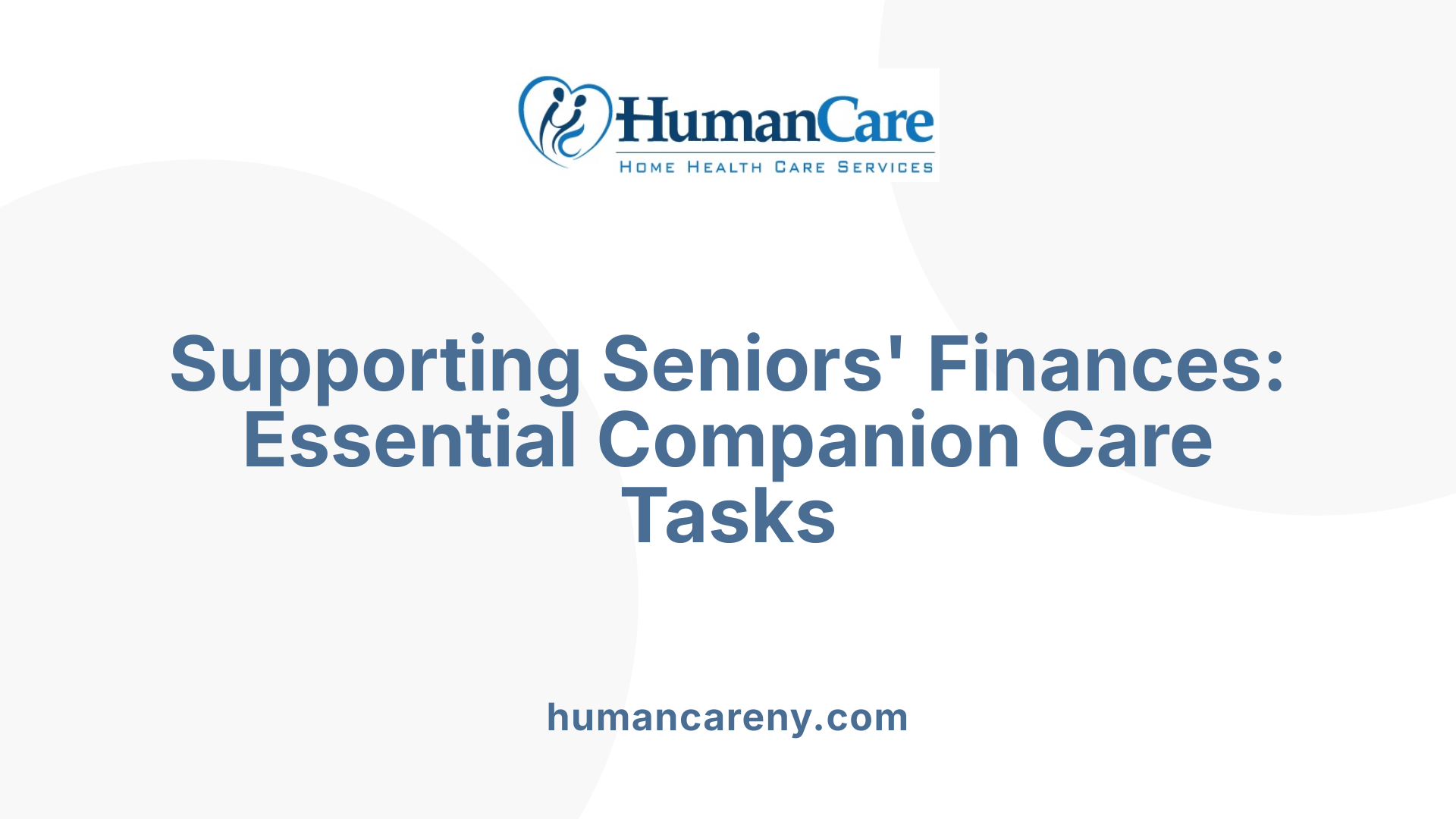Understanding the Role of Companion Care in Financial Assistance
As seniors aim to maintain independence and a quality life at home, the support provided by companion caregivers extends beyond social interaction to include essential assistance with household finances. While these caregivers primarily focus on social and light support activities, their role can significantly influence how seniors manage their financial responsibilities, ensuring safety, organization, and adherence to legal and financial protocols.
The Scope of Companion Care Services Related to Household Finances

Assistance with shopping, bill paying, and errands
Companion caregivers play a pivotal role in helping seniors manage their household finances indirectly. They assist with shopping for groceries, household essentials, and personal care items, ensuring that seniors have what they need without the physical strain of errands. They can also help with paying bills, such as rent, utilities, and medications, either by running errands or reminding seniors to make payments on time. Additionally, caregivers may assist with filling out forms and managing important documents, which helps prevent missed deadlines and late fees.
Support with food preparation and medication reminders
A significant part of companion care involves meal planning and preparation, which supports seniors’ nutritional needs and daily routines. Proper medication reminders help ensure adherence to prescribed health regimens, indirectly reducing healthcare costs caused by missed doses or adverse reactions. While they do not handle medication administration, their role in reminding seniors to take medications supports overall health and reduces potential emergency expenses.
Transportation to financial or healthcare appointments
Transportation services provided by companions are vital in enabling seniors to attend medical, financial, and legal appointments. By ensuring timely access to healthcare providers, banks, or legal offices, companions help seniors stay organized and maintain control over their household finances. Regular transportation also supports shopping trips for essential supplies, helping seniors manage household expenses effectively.
Monitoring health and wellbeing, communicating concerns
Companion caregivers regularly monitor seniors’ health and overall wellbeing. This ongoing observation allows caregivers to detect and communicate any concerns regarding physical or mental health, which can preempt expensive medical issues or emergency interventions. They serve as an early warning system, helping families and healthcare providers address issues promptly while supporting a senior’s independence.
Resources and Programs Supporting Financial Needs
A broad array of resources and programs exist to assist caregivers and seniors in managing household financial burdens. The National Family Caregiver Support Program (NFCSP), available through local Area Agencies on Aging, offers respite care, counseling, and training. Veterans benefits such as the Aid and Attendance Pension Support and Veteran-Directed Home and Community-Based Services provide financial stipends and support. State-specific initiatives include paid family leave programs, Medicaid-funded caregiver payments, and grants for home modifications. Additional options include long-term care insurance benefits, healthcare savings accounts, and specialized programs like SilverBills, which streamline bill payments.
| Program/Resource | Description | Eligibility & Notes |
|---|---|---|
| NFCSP | Provides respite, training, and support services | Available nationwide via local agencies |
| VA Caregiver Support | Offers education, financial stipends, and support | For caregivers of veterans, with specific programs like Aid and Attendance |
| Medicaid HCBS Waivers | Reimburse family caregivers and fund home services | Varies by state and qualification |
| Medicare Advantage Benefits | Supplements for home safety devices and supplies | Vary by plan and provider |
| Grants & Charitable Aid | Offer financial support for home modifications, equipment | Usually need application through agencies or foundations |
How do caregivers help seniors manage household finances?
Caregivers play a crucial role in overseeing everyday financial tasks. They assist with paying bills, maintaining budgets, and monitoring bank accounts, helping seniors stay financially safe and secure. They also help set up legal protections—such as power of attorney, wills, and healthcare directives—to sidestep future legal or financial issues. By using community resources and government programs, caregivers can access additional aid, reducing financial strain.
Creating a structured financial plan, automatically scheduling bill payments, and building an emergency fund are practical steps caregivers recommend. Further support can come from financial counseling services or tools like SilverBills, which automate bill payment to reduce errors and late fees.
What types of financial support can family caregivers receive?
Family caregivers may qualify for support from various sources. Medicaid often reimburses family members for personal care tasks via specific waivers or consumer-directed programs. Veteran programs such as the Aid and Attendance benefit or the Program of Comprehensive Assistance offer stipends or cash allowances to eligible caregivers.
Some states provide paid family leave, allowing caregivers to take paid time off while caring for loved ones. Private long-term care insurance policies might also include reimbursement options. Tax credits like the Child and Dependent Care Credit and deductions for medical expenses associated with caregiving further offset costs.
Can caregivers get paid for assisting with household finances?
Yes, under certain conditions. Many government programs enable family members to receive payments for caregiving, including financial management tasks. Medicaid’s self-directed services or veteran programs like VA's PCAFC may allow compensation for aid with household finances. Eligibility depends on specific state regulations and program criteria, but these options exist to support caregivers financially.
Are there programs to assist caregivers financially or provide payment for caregiving?
Numerous programs are available. Medicaid-funded care programs often pay family members for personal care, medication management, and household tasks. The Family Caregiver Support Program (FCSP) offers respite and support, sometimes including financial aid. Veteran-specific initiatives provide stipends for qualified caregivers. Other options include paid family leave laws and long-term care insurance benefits.
How can caregivers apply for disability benefits or assistance?
Caregivers should explore applying for Social Security Disability Insurance (SSDI) or Supplemental Security Income (SSI) for their loved ones, often through online tools or local offices. For veterans, the VA’s caregiver programs offer applications for stipends and support services. State programs for paid family leave and respite care may have online or in-person application processes. Local agencies like the Area Agencies on Aging can provide assistance through counseling and application help.
This broad spectrum of resources underscores the comprehensive support network available to caregivers, enhancing their ability to assist seniors effectively while managing household finances responsibly.
Legal and Ethical Guidelines in Managing Household Finances

What should a caregiver avoid doing when assisting seniors with household finances?
When helping seniors manage their household finances, caregivers must adhere to strict legal and ethical standards to protect the senior’s well-being and financial security. One primary consideration is the importance of establishing clear legal documents such as a power of attorney and healthcare directives. These documents authorize the caregiver to act on behalf of the senior legally and ethically.
Caregivers should always maintain transparency in financial dealings. This means keeping detailed records of all expenses, purchases, and transactions. Proper documentation ensures accountability and helps prevent misunderstandings or accusations of misuse.
It is equally important to avoid actions that could be considered elder abuse or conflicts of interest. Caregivers must not co-mingle the senior’s funds with their own or use the senior’s assets for personal benefit. Making impulsive or emotionally motivated financial decisions without proper authorization can harm the senior and may lead to legal consequences.
Respect for the senior’s autonomy is crucial. Caregivers should support the senior’s ability to make their own decisions whenever possible. Ignoring legal procedures or failing to follow established directives, such as neglecting to set up or respect trusts or durable powers of attorney, can result in legal complications.
In summary, caregivers should steer clear of performing unauthorized medical or financial activities, mishandling funds, or keeping financial information hidden. Upholding ethical standards involves transparency, respecting the senior’s choices, and following legal guidelines to ensure trust and safety in financial management.
Empowering Caregivers to Support Financial Stability
Supporting seniors with household finances is a vital aspect of companion caregiving that requires a combination of practical assistance, access to resources, and adherence to legal and ethical standards. While companion caregivers focus largely on social and light support activities, their role in managing or facilitating household financial tasks is increasingly recognized as crucial for ensuring seniors' independence and financial security. With a broad spectrum of programs—ranging from government stipends, legal protections, grants, insurance benefits, and community resources—caregivers are equipped to provide significant support. Educating caregivers about available resources, legal responsibilities, and ethical guidelines enhances their capacity to assist effectively, helping seniors age in place with dignity, safety, and financial stability.
References
- What Is Companion Care for Seniors? - ElderLife Financial Services
- Get paid as a caregiver for a family member | USAGov
- Finding Financial Assistance for Family Caregivers
- Services for Older Adults Living at Home | National Institute on Aging
- 8 Ways Companion Care Helps Seniors Live at Home Longer
- Family Caregiver Services - California Department of Aging
- Five Ways Family Caregivers Can Get Paid
- What Can a Companion Caregiver Do For You? - Visiting Angels
- Senior Companion - Illinois Department on Aging



